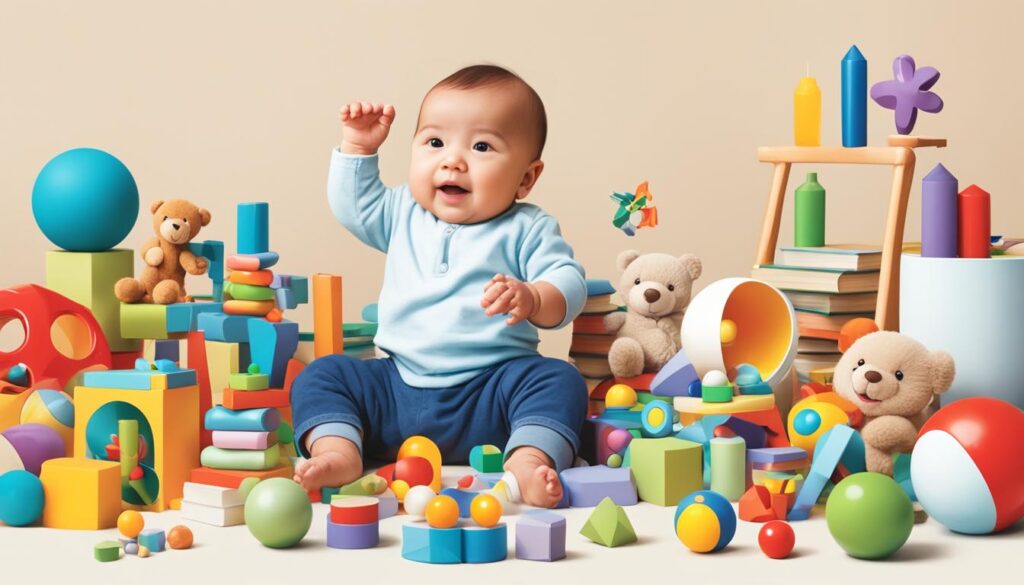When it comes to baby care, every parent wants to provide the best for their little one. From newborn care to infant care, ensuring their health and wellbeing is of utmost importance. But what are the secrets to mastering the art of baby care?
The Reality of Parenthood
Parenthood is a beautiful and rewarding journey, but it also comes with its fair share of challenges. Sleepless nights, endless diaper changes, and constant baby feeding sessions become the norm in the early days of parenthood. Multitasking becomes a necessary skill as parents find themselves juggling various tasks throughout the day. It’s a rollercoaster of emotions, with moments of pure bliss and overwhelming anxiety and self-doubt.
As parents, we embark on a continuous learning journey as our little ones go through different stages of baby development. From learning how to soothe a crying baby to navigating the tumultuous waters of toddlerhood, parenting demands flexibility and adaptability. We find ourselves sacrificing our own needs and desires to prioritize the happiness, safety, and well-being of our children.
Each child is unique, with their own set of personality traits and needs. It’s a constant learning process to figure out what works best for them, whether it’s finding the perfect baby skincare routine or ensuring a safe environment for their exploration and baby development. Parenthood is a delicate balance of providing guidance and allowing our children to explore and grow at their own pace.
Despite the challenges, parenthood is a profoundly rewarding journey filled with unconditional love, personal growth, and cherished memories. It’s in those quiet moments of holding our baby close or witnessing their first steps that we realize the immense joy and fulfillment that parenthood brings.
“Parenthood requires love, not DNA.”
Baby feeding, baby skincare, baby safety, and baby development are the cornerstones of our parenting journey. It’s the responsibility and privilege we embrace as we navigate the complexities of raising our little ones, knowing that our efforts are shaping their futures.
Now, let’s take a closer look at some key aspects of parenthood, including baby feeding, skincare, safety, and development, and explore the strategies and resources available to help us navigate this incredible journey. But first, let’s dive into the reality of parenting and the challenges it entails.

The Journey of Love and Growth
The reality of parenthood is a mix of love, growth, and challenges. It’s a journey that tests our patience, pushes our limits, and changes us in ways we never imagined. Yet, it’s a journey we willingly embark on, knowing that the rewards far outweigh the difficulties. It’s in these moments of vulnerability and strength that we realize the incredible depth of our love for our children and the profound impact we have on their lives.
Join me in the next section as we explore the essential aspects of baby feeding, skincare, safety, and development, and discover the tools and resources that can support us on this incredible journey of parenthood.
The Secret Behind Successful Parenting
Successful parenting is a journey filled with love, joy, and growth. It involves navigating various challenges and making important decisions to ensure the well-being and development of your child. To unlock the secret behind successful parenting, there are several key factors to consider.
- Setting Realistic Expectations: It’s important to understand that parenthood is not always perfect. Setting realistic expectations for yourself, your child, and the parenting journey can help you navigate challenges with grace and patience.
- Building a Support System: Surrounding yourself with a support system of family, friends, and other parents can provide valuable advice, encouragement, and assistance when needed. Sharing experiences and learning from others can help you feel connected and supported.
- Prioritizing Self-Care: Taking care of yourself physically, emotionally, and mentally is essential for being the best parent you can be. Prioritize self-care activities that recharge and rejuvenate you, allowing you to show up fully for your child.
- Embracing Continuous Learning: Parenthood is a journey of growth and learning for both you and your child. Stay curious and open-minded, seeking out information, resources, and professional guidance to adapt your parenting approach as your child grows and develops.
- Spending Quality Time: Creating special moments and spending quality time with your child strengthens your bond and fosters their emotional and intellectual development. Engage in activities that promote learning, exploration, and quality interactions.
- Practicing Patience and Flexibility: Parenthood can be filled with surprises, challenges, and unexpected turns. Cultivating patience and flexibility allows you to adapt and respond to the ever-changing needs of your child with understanding and love.
- Seeking Professional Guidance: Don’t hesitate to seek professional guidance when needed. Pediatricians, therapists, and other experts can provide valuable insights, support, and resources to help you navigate any difficulties or concerns that arise.
Remember, every parent’s journey is unique, and there is no one-size-fits-all approach to parenting. Trust your instincts, listen to your child’s needs, and adapt your parenting style to best support their growth and development. By embracing these secrets, you’ll be better equipped to navigate the challenges and joys of parenthood.
The Formula for Master Parenting
According to researchers Ronald Ferguson and Tatsha Robertson, the formula for master parenting consists of eight roles. These roles are like different hats that parents wear throughout their journey of raising a child. Each role serves a specific purpose and contributes to the overall development and success of the child.
Let’s explore these eight roles:
- Early Learning Partner: The early learning partner role focuses on hooking children on learning from a young age. This involves creating a stimulating environment, providing age-appropriate educational resources, and encouraging a curious and explorative mindset.
- Flight Engineer: The flight engineer role ensures that the child is getting what they need from school and intervenes if necessary. It involves monitoring the child’s academic progress, communicating with teachers, and providing additional support and resources when needed.
- Fixer: The fixer role ensures that no big opportunity is lost due to lack of resources. It involves identifying and addressing any obstacles or challenges that may hinder the child’s growth and development. This could include financial support, access to extracurricular activities, or mentorship.
- Revealer: The revealer role shows children the wonders of the world, regardless of their socioeconomic background. It involves exposing the child to various experiences, cultures, and perspectives. This could include traveling, visiting museums, attending cultural events, and encouraging intellectual curiosity.
- Philosopher: The philosopher role helps children find purpose and answers their deep questions about life. It involves engaging in meaningful discussions, encouraging critical thinking, and helping the child develop their own worldview and belief system.
- Model: The model role provides a positive role model for children to emulate. It involves demonstrating desirable values, behaviors, and habits. Children learn by observing their parents, so being a good role model is essential in shaping their character and personality.
- Negotiator: The negotiator role teaches children to be respectful but also how to self-advocate. It involves teaching them effective communication skills, conflict resolution, and how to navigate different social situations. This role helps children develop confidence and assertiveness.
- GPS Navigational Voice: The GPS navigational voice role serves as the parent’s voice in the child’s head, guiding them through new situations in life. It involves providing guidance, advice, and support whenever the child faces uncertainties or challenges. This role helps the child develop resilience and problem-solving skills.
Implementing these roles can help cultivate the qualities necessary for success in children. It’s important to remember that each role is equally important and contributes to the overall growth and development of the child.

Next, let’s dive deeper into each role and explore how parents can effectively fulfill them to create a nurturing and supportive environment for their children.
Conclusion
Parenthood is a journey of love, growth, and cherished memories. It is a rewarding and fulfilling experience, despite its challenges. To become a master parent, it’s important to set realistic expectations, build a strong support system, prioritize self-care, embrace continuous learning, and spend quality time with your child.
By implementing the formula for master parenting, which consists of eight roles, you can cultivate the qualities necessary for successful parenting. These roles include being an early learning partner, flight engineer, fixer, revealer, philosopher, model, negotiator, and GPS navigational voice for your child.
Throughout this rewarding journey of parenthood, you have the opportunity to witness your child’s growth and discovery, guided by your love and care. Every step along the way is a precious gift, shaping not only your child’s life but also your own. Parenting creates a legacy of love, connection, and lasting memories that will endure for generations.
FAQ
What are some essential baby care products I should have?
Some essential baby care products you should have include diapers, baby wipes, baby lotion, baby shampoo, baby clothes, a baby bathtub, a baby monitor, and a car seat.
How often should I feed my newborn?
Newborns typically need to be fed every 2-3 hours, or whenever they show signs of hunger, such as rooting or sucking on their hands.
What are some important safety precautions to take for my baby?
Some important safety precautions to take for your baby include always placing them to sleep on their back, keeping small objects and choking hazards out of reach, securing furniture and electrical cords, and never leaving your baby unattended on elevated surfaces.
How can I support my baby’s development?
You can support your baby’s development by engaging in activities that stimulate their senses, such as reading books, playing with toys, singing songs, and providing opportunities for tummy time and crawling.
What are some common signs of a happy and healthy baby?
Common signs of a happy and healthy baby include regular eating and sleeping patterns, good weight gain, alertness and responsiveness, and reaching developmental milestones on time.
How can I establish a bedtime routine for my baby?
To establish a bedtime routine for your baby, start with a consistent bedtime, create a calming environment, incorporate soothing activities like a warm bath or gentle massage, and be consistent with the order of activities each night.
How do I know if my baby is getting enough breast milk?
Signs that your baby is getting enough breast milk include regular wet and soiled diapers, good weight gain, a content and satisfied demeanor after feeding, and meeting developmental milestones.
When should I start introducing solid foods to my baby?
Most babies are ready to start solid foods around 6 months of age. Look for signs of readiness, such as the ability to sit up with support, increased curiosity about food, and the ability to swallow semi-solid foods.
What are some important safety tips for bathing my baby?
Some important safety tips for bathing your baby include never leaving them unattended, keeping the water temperature warm but not hot, supporting their head and neck while washing, and using non-slip mats in the bath or sink.
How can I help soothe my baby when they’re fussy?
To help soothe your baby when they’re fussy, try swaddling them, rocking or gently bouncing them, playing white noise or soothing music, offering a pacifier, or going for a calming walk outside.

